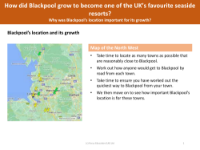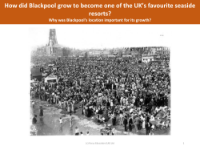Why was Blackpool's location important for its growth? - Presentation

Geography Resource Description
Blackpool's strategic location in the North West of England was a significant factor in its development into one of the UK's most beloved seaside resorts. The town is situated within easy travelling distance from a cluster of industrial towns such as Blackburn, Burnley, Rochdale, Bury, Bolton, Wigan, Oldham, and not least, the city of Manchester. This proximity to populous areas meant that Blackpool was readily accessible by road to a large potential visitor base. The concept of 'Wakes' weeks played a crucial role in this growth. Originating as unpaid holidays for workers when the mills closed for maintenance, 'Wakes' evolved into staggered holiday periods for different towns, ensuring a steady flow of visitors to Blackpool throughout the summer months, keeping the resort bustling with activity.
During the Industrial Revolution, the 'Wakes' holidays became a regular summer tradition, particularly for the industrial towns of the North West and the Midlands. Factories and mills would shut down for a designated week, which by the 20th century often extended to a fortnight with pay, leading to a mass migration of residents to Blackpool for their annual seaside holiday. This tradition created a reliable and rotating customer base for the town, resulting in the establishment of numerous boarding houses and bed and breakfast accommodations. Pupils are encouraged to consider the attractions that drew people to Blackpool during the 20th century and how the Wakes system contributed to the town's growth. They also reflect on why, despite its enduring popularity, Blackpool does not attract the same numbers of visitors today as it did in its mid-20th century heyday.






